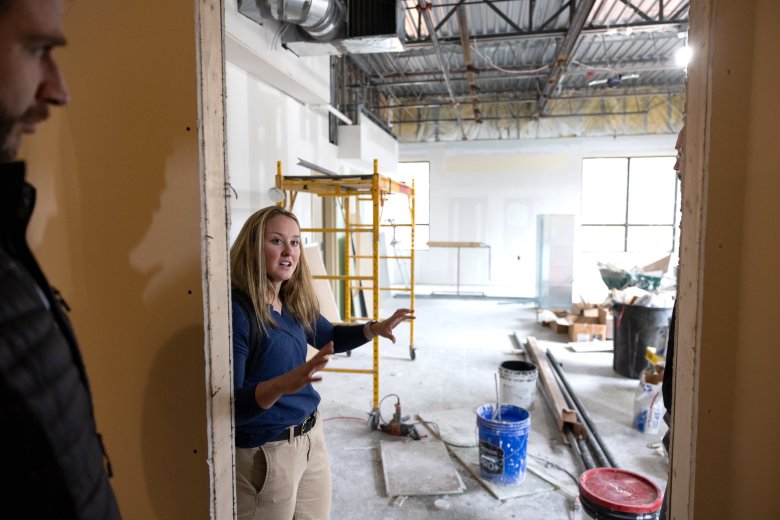Lifestyle
United Way Launches New Child Care Centers to Tackle Crisis

United Way is set to open two new child care facilities in early spring of 2026, aiming to address the pressing issues of access and affordability in child care across Maine. One center is located on Gannett Drive in South Portland, while the second will be in Freeport. Together, these facilities will provide care for approximately 200 infants and young children, helping to alleviate what many are describing as a child care crisis in the state.
Josh Waxman, senior vice president of community impact at United Way of Southern Maine, emphasized the urgency of the situation. “The reality is there are too many working families that aren’t starting families in Maine because they don’t have child care,” he stated. This initiative is part of the nonprofit’s broader United 4 Children program, which seeks to improve child care accessibility for working families, particularly those living paycheck to paycheck.
Addressing Child Care Challenges
Maine has faced challenges regarding child care access and affordability for years. The new United Way centers will utilize a public-private partnership model. Business partners, who are yet to be announced, will contribute charitable donations to support the initiative. In return, these businesses will offer child care services to their employees and the wider community. Rebecca Alfredson, senior director of programs for United Way, highlighted the necessity of creating a model that serves both high-skilled professionals and lower-wage workers alike.
In addition to the centers in South Portland and Freeport, United 4 Children plans to establish several more facilities across southern Maine over the next five years. This expansion aims to increase child care capacity significantly, addressing a critical barrier to workforce participation in the region.
Maine lawmakers are also actively engaged in addressing the child care access issue. Senate President Mattie Daughtry has spent months visiting various child care facilities to gather insights from operators and users. She is drafting legislation that will consolidate these findings into actionable policy recommendations, which she intends to present in January. Daughtry stressed the importance of fairly compensating child care workers for their essential roles.
Exploring Sustainable Solutions
While Maine offers some support programs for the child care industry, including a stipend for workers, these measures often fall short. Daughtry noted that existing programs are vulnerable and require more sustainable funding mechanisms. “We need to find really, truly sustainable funding mechanisms,” she said, emphasizing the need to protect critical support programs.
The challenges in child care are not unique to United Way; businesses across the state are also seeking innovative solutions. Bath Iron Works, one of Maine’s largest employers, has opened its own child care center in Brunswick, offering 120 slots, predominantly for its employees. This reflects a growing trend where employers recognize the importance of child care availability for their workforce.
The idea for the new United Way centers emerged from discussions among business leaders concerning how the lack of quality, affordable child care affects employee productivity. Quincy Hentzel, president of the Portland Regional Chamber of Commerce, indicated that a survey of over 1,000 employees revealed significant reliance on mixed care arrangements, with a substantial portion of respondents expressing a need for support outside traditional work hours.
To maximize the impact of the new facilities, United Way is collaborating with a licensed child care provider to manage staffing—one of the industry’s most significant challenges. Plans include developing options for second- and third-shift workers, which could be operational within the next two to three years.
Despite the progress, the journey to improving child care access is fraught with regulatory hurdles that can impede development. Alfredson pointed out that while regulations are necessary for safety, they can create barriers that complicate the establishment of new facilities. She advocates for a more streamlined approach to regulation, drawing a parallel to the rapid responses seen during the COVID-19 pandemic.
As United Way prepares to unveil these new centers, the organization is committed to tackling the myriad challenges facing the child care sector. Waxman concluded, “We’re calling this a crisis… the government response needs to catch up to the reality of the situation.”
-

 Science4 weeks ago
Science4 weeks agoInterstellar Object 3I/ATLAS Emits Unique Metal Alloy, Says Scientist
-

 Science4 weeks ago
Science4 weeks agoResearchers Achieve Fastest Genome Sequencing in Under Four Hours
-

 Politics4 weeks ago
Politics4 weeks agoAfghan Refugee Detained by ICE After Asylum Hearing in New York
-

 Business4 weeks ago
Business4 weeks agoIconic Sand Dollar Social Club Listed for $3 Million in Folly Beach
-

 Health4 weeks ago
Health4 weeks agoPeptilogics Secures $78 Million to Combat Prosthetic Joint Infections
-

 Business4 weeks ago
Business4 weeks agoMcEwen Inc. Secures Tartan Lake Gold Mine Through Acquisition
-

 Lifestyle4 weeks ago
Lifestyle4 weeks agoJump for Good: San Clemente Pier Fundraiser Allows Legal Leaps
-

 Science4 weeks ago
Science4 weeks agoMars Observed: Detailed Imaging Reveals Dust Avalanche Dynamics
-

 Health4 weeks ago
Health4 weeks agoResearcher Uncovers Zika Virus Pathway to Placenta Using Nanotubes
-

 World4 weeks ago
World4 weeks agoUS Passport Ranks Drop Out of Top 10 for First Time Ever
-

 Entertainment4 weeks ago
Entertainment4 weeks agoJennifer Lopez Addresses A-Rod Split in Candid Interview
-

 Business4 weeks ago
Business4 weeks agoSan Jose High-Rise Faces Foreclosure Over $182.5 Million Loan









